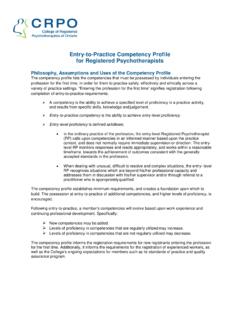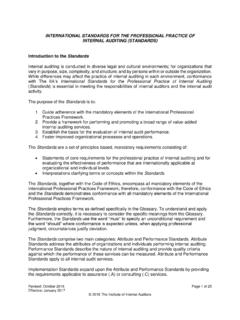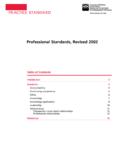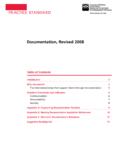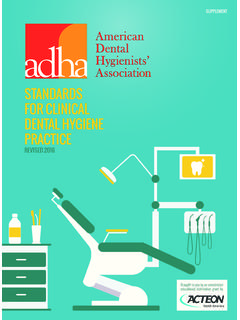Transcription of Professional Practice Standards - crpo.ca
1 Professional Practice Standards For Registered Psychotherapists Appoved by Council January 15, 2014. Revised November 24, 2016. Professional Practice Standards FOR REGISTERED PSYCHOTHERAPISTS. TABLE OF CONTENTS. Introduction ..3. Section 1 Professional Conduct ..4. Accepting the Regulatory Authority of the College ..5. Use of Terms, Titles and Designations ..8. Reporting Unsafe practices ..11. Controlled Acts ..13. General Conduct ..14. Conflict-of-interest ..15. Dual and Multiple Undue Influence and Abuse ..20. Referral ..22. Section 2 Competence ..24. Consultation, Clinical Supervision and Referral.
2 24. Section 3 Client-Therapist Relationship ..26. Confidentiality ..26. Consent ..29. Communicating Client Care ..33. Electronic Practice ..35. Unnecessary Treatment ..37. Complaints Affirming Sexual Orientation and Gender Identity ..39. Section 4 Clinical Supervision ..41. Providing Clinical Supervision ..41. Practising with Clinical Supervision ..45. Section 5 Record-keeping and Documentation ..47. Record-keeping Clinical Records ..47. Failing to Provide Reports ..51. Issuing Accurate Documents ..52. Record-keeping Appointment Records ..53. Record-keeping Financial Records.
3 54. Record-keeping Storage, Security and Retrieval ..55. Section 6 Business practices ..57. Fees ..57. Advertising and Representing Yourself and Your Services ..60. Discontinuing Services ..63. Closing, Selling, or Relocating a Practice ..65. 2. Professional Practice Standards FOR REGISTERED PSYCHOTHERAPISTS. INTRODUCTION. As part of its mandate under the Regulated Health Professions Act, 1991, (RHPA) every health regulatory college is required to develop and establish Professional Practice Standards for its members. Colleges often start with a basic set of Standards , which typically evolve over time.
4 Initially, Practice Standards focus mainly on Professional conduct and items rooted in legislation and regulations, such as confidentiality, consent, record-keeping, business practices and the like. Over time, limited clinical' Standards may be developed, often the result of a perceived need when a particular therapeutic approach or assessment method proves problematic for members. These concerns may be identified through the College's Quality Assurance Program, or may come to light through the complaints process. This initial set of Professional Practice Standards for Registered Psychotherapists is based largely on the Professional Misconduct Regulation developed by CRPO's Council under the Psychotherapy Act, 2007 and subsequently approved by the Ministry of Health and Long-Term Care and the Government of Ontario.
5 Provisions of the Professional Misconduct Regulation have been incorporated into the Standards and are re-stated in plain language, with detail added to help our members understand what is expected in the Practice environment. Standards have the force of law when based directly on the statutory regulations of the College, and are distinct from guidelines. Guidelines, which the College may develop in the future as the need arises, provide more detailed information on how to apply Standards in particular circumstances. Guidelines are less directly enforceable and are provided to assist members in their thinking and decision-making when considering issues that may arise in their daily Practice .
6 In addition, Council has developed a Code of Ethics, which also is not directly enforceable, but establishes a level of conduct that members should strive to uphold. These Standards were developed by members of the profession drawn from a wide range of specialties and modalities, and by members of Council who are not members of the profession. The Standards were laboured over for many months and are the product of extensive research, discussion, debate, and ultimately, the need to arrive at consensus. As a final step in their development, these Professional Practice Standards were circulated for stakeholder comment, and revisions were made based on stakeholder input.
7 As members of a regulated profession, Registered Psychotherapists (RPs) have particular duties to clients, colleagues, the College, and the general public. CRPO Professional Practice Standards describe the minimum acceptable Professional Standards expected of members; they are not intended as best practices . Members are expected to practise in accordance with these Standards and to apply them consistently in their Practice environments. In addition, they should ensure that their employees abide by these Standards and do not act on behalf of members in a manner that falls below expected levels of professionalism.
8 Similarly, members must take care not to enter into employment or business relationships that would impede their ability to meet Professional Standards . This document is divided into six sections: 1. Professional Conduct 2. Competence 3. Client-Therapist Relationship 4. Clinical Supervision 5. Record-keeping and Documentation 6. Business practices 3. Professional Practice Standards FOR REGISTERED PSYCHOTHERAPISTS. Each section includes an introduction and several Standards . Each standard provides background and context, states the standard concisely, and provides advice to assist members on how they may demonstrate the standard.
9 At the end of each section, the reader is referred to related Standards . These Professional Practice Standards were approved by Council on January 15, 2014. They will be reviewed and updated periodically. SECTION 1 Professional CONDUCT. Members of self-regulated professions are held to Standards of Professional conduct in their Practice and, to a certain extent, in their personal lives. Professional conduct encompasses interactions with the College, clients, colleagues, other professionals and the public. As the governing body of the profession, the College's ability to fulfil its public protection mandate depends on the cooperation of members in various aspects of College activities.
10 Key to this is members' acceptance of the regulatory authority of the College based in legislation in this case, the Regulated Health Professions Act, 1991. and the Psychotherapy Act, 2007. Together, these two statutes constitute the legislative framework of the College. Professional conduct, among other things, comprises the proper use of titles, including one's regulated title and any specialty titles a member may have earned. Members must comply with any terms, conditions or limitations placed on their Certificate of Registration, and must participate in the College's Quality Assurance Program.
